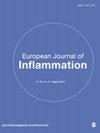甘露聚糖结合凝集素缺乏与新冠肺炎血栓形成率和死亡率:免疫缺陷的部分保护
IF 0.8
4区 医学
Q4 IMMUNOLOGY
引用次数: 0
摘要
目的:本研究旨在确定新冠肺炎感染对甘露糖结合凝集素缺乏症患者的影响。方法:从2020年3月至2022年8月,对MBL缺乏和新冠肺炎阳性检测进行电子病历搜索。进行个性化图表分析,并进行统计分析。结果:WVU医疗卫生系统中有33人被诊断为甘露糖结合凝集素缺乏,并被诊断为新冠肺炎。该队列的平均年龄为41岁。七个人的症状严重到需要去急诊室就诊。一人住院治疗。MBL缺乏者的住院几率是普通人群的7倍(p=.1506,OR 7.06(CI 1.117-44.52))。MBL缺乏人群的死亡率为零。没有一名患者报告血栓或血栓。结论:这项对已知MBL缺乏和新冠肺炎感染者的回顾性横断面分析表明,该队列中死亡和血栓事件的风险较低。然而,与普通公众相比,住院的几率更高,尽管这在统计上并不显著。本文章由计算机程序翻译,如有差异,请以英文原文为准。
Mannose binding lectin deficiency and COVID-19 rates of thrombosis and mortality: Partial protection by immunodeficiency
Objective: The purpose of this study is to determine the effects of COVID-19 infection on individuals with mannose binding lectin deficiency. Methods: An electronic medical records search was conducted for MBL deficiency and COVID-19 positive tests from March 2020-August 2022. Individualized chart analysis was conducted and statistical analysis was performed. Results: Thirty-three people in WVU medicine health system carry a diagnosis of mannose binding lectin deficiency and were diagnosed with COVID-19. The mean age of this cohort was 41 years. Seven individuals had severe enough symptoms to lead to an emergency department visit. One person was hospitalized. MBL deficient individuals had 7 times the odds of hospitalization ( p = .1506, OR 7.06 (CI 1.117-44.52)) compared to the general public. There was zero mortality among the MBL deficient population. None of the patients reported thrombosis or blood clots. Conclusion: This retrospective cross-sectional analysis of those with known MBL deficiency and COVID-19 infection suggest a lower risk of fatalities and thrombotic events in this cohort. There was however a higher odds ratio of hospitalization compared to the general public, although this was not statistically significant.
求助全文
通过发布文献求助,成功后即可免费获取论文全文。
去求助
来源期刊
CiteScore
0.90
自引率
0.00%
发文量
54
审稿时长
15 weeks
期刊介绍:
European Journal of Inflammation is a multidisciplinary, peer-reviewed, open access journal covering a wide range of topics in inflammation, including immunology, pathology, pharmacology and related general experimental and clinical research.

 求助内容:
求助内容: 应助结果提醒方式:
应助结果提醒方式:


